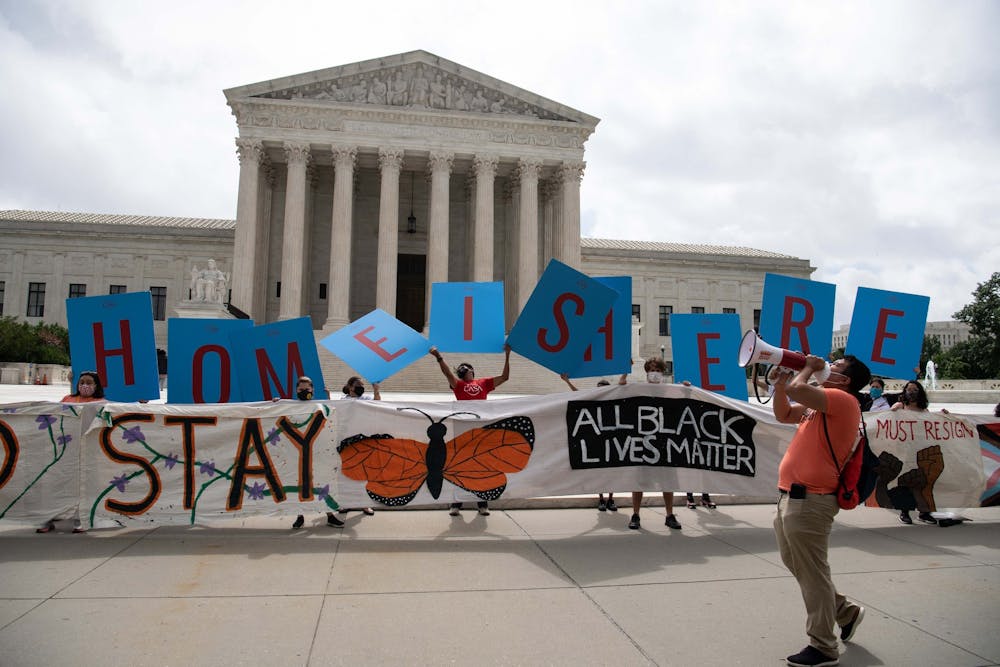Luis Zambrano has woken up with the sun every Monday and Thursday for the past several weeks, checking the news to see if the U.S. Supreme Court had issued a decision about the future of his protections guaranteed by the Deferred Action for Childhood Arrivals program.
He was uncertain as he waited, sure the system would work against him.
"The weeks leading up to this, I’ve been dreading what (the court) was going to say," said Zambrano, a senior studying journalism and communications director for Undocumented Students for Education Equity at ASU. "It seemed like DACA was going to get rescinded and then my life would change dramatically."
Zambrano woke up early Thursday as he had done for weeks, the same as so many other students like him did, and at the edge of his seat, read every calculated and meticulous word of Cheif Justice John Roberts' opinion.
"Once the decision came in today, I was shocked," Zambrano said. "This is the first time in a long time that I actually had a sigh of relief."
The Supreme Court, in a 5-4 decision, ruled the Trump administration cannot end DACA based on the administration's lack of justification to end the program.
The program protects over 600,000 young immigrants from deportation. Former President Barack Obama created the program in 2012 to protect those brought to the U.S. as children who do not possess citizenship or legal residency status.
Zambrano said he felt tremendous stress and anxiety over the decision and said he is incredibly lucky to have some form of protection.
"There are many wonderful undocumented students at ASU," Zambrano said. "Not even just in school, but people just working deserve similar kinds of protections.
"And we always have to take that into account because no matter the anxiety, depression, whatever that I’ve felt, they have it worse and they cannot be forgotten."
In a statement about the decision, ASU President Michael Crow said the "Court’s ruling aligns with Arizona State University’s constitutionally mandated mission to provide access to quality education and our institutional commitment to support the success of all students, including undocumented, college-bound graduates of Arizona high schools."
Crow acknowledged the practical implication of the decision, but touched on the opinion itself writing that "the challenge for DACA recipients and other undocumented students is not over," and that "ASU will continue to support a permanent resolution that addresses residency for all undocumented students."
The decision says the way Trump tried to end the program was not adequate. Previous members of his administration, namely then-Attorney General Jeff Sessions, called the program illegal, unconstitutional and an abuse of executive power.
"The dispute before the Court is not whether DHS may rescind DACA," Roberts wrote in the majority opinion. "All parties agree that it may. The dispute is instead primarily about the procedure the agency followed in doing so."
Roberts was joined by Justices Ruth Bader Ginsburg, Stephen Breyer, Sonia Sotomayor and Elena Kagan in the majority opinion, stating that the Trump administration needs a better explanation for ending the program than what was provided in this case.
The four more conservative justices dissented. Justice Clarence Thomas wrote a dissenting opinion that was joined by Justices Samuel Alito and Neil Gorsuch.
Thomas wrote that DACA was illegal from the start and that the majority ruling overlooked "DACA’s obvious legal deficiencies" while asking the Department of Homeland Security to "provide additional policy reasons and justifications before restoring the rule of law."
"President Trump’s Acting Secretary of Homeland Security inherited a program created by President Obama’s Secretary that was implemented without statutory authority and without following the APA’s required procedures," Thomas wrote. "Then-Attorney General Sessions correctly concluded that this ultra vires program should be rescinded. These cases could — and should — have ended with a determination that his legal conclusion was correct."
Justice Brett Kavanaugh wrote a separate dissenting opinion.
"To see this country hold the life of my friends and family in its hands without any idea if it was getting ready to take away their right to live, was something that created a lot of stress and anxiety," said Stephanie Robles, a senior majoring in communication and political science and chief of staff at USEE, in an email.
At a rally in front of Phoenix’s Immigration and Customs Enforcement field office, students and community organizers said the next steps are abolishing ICE, ending collaborations between the Phoenix police, DHS, ICE and border patrol.
Robles said she was not at the rally because she was feeling ill but said the unity and power of those in attendance could be felt through her computer screen.
Zambrano said speeches about the work left to do and personal stories about police encounters, family deportations and immigrant stories moved him. He wasn’t there to speak but shared his story of being a student in America.
"I’ve had several moments related to immigration where I’ve been fearing for my life," Zambrano said, recalling a time he was pulled over by police officers. "All I could think of is one thing. DACA. I have it.
"We can relax, we can celebrate for a day. But there are others who can’t really afford to do that," Zambrano said.
Ending the DACA program was a 2016 campaign promise from Trump, as was securing the country’s borders and passing immigration regulation and reform. Trump claimed in 2019 that former President Barack Obama did not have the power to sign the bill, according to NPR.
Trump has a rally scheduled for June 23, and students said they were planning to be there, standing up for DACA and asking for protection to be extended.
"We know that as a community and as a movement we have to keep fighting," Robles wrote. "DACA is not enough and we have to continue to fight for the rights of the entire undocumented community."
President of ASU College Republicans said the club fully supports Dreamers and thought the Trump administration’s attempt to stop the program was an example to further “executive fiat,” said Joe Pitts, a sophomore studying business law.
"Congress has to work together toward reform so there’s no longer limbo," Pitts said.
While abolishing ICE is not a talking point for Republicans, Pitts said the club does want to put an end to the visa lottery system and find solutions to secure borders to airplanes and ships in a bipartisan fashion.
"We demand that American lawmakers pass permanent reforms," Zambrano said. "Not just because DACA is great but because DACA is temporary."
Reach the reporters at pjhanse1@asu.edu and wmyskow@asu.edu and follow @piperjhansen and @wmyskow on Twitter.
Like The State Press on Facebook and follow @statepress on Twitter.

Wyatt Myskow is the project manager at The State Press, where he oversees enterprise stories for the publication. He also works at The Arizona Republic, where he covers the cities of Peoria and Surprise.

Piper Hansen is the digital editor-in-chief at The State Press, overseeing all digital content. Joining SP in Spring 2020, she has covered student government, housing and COVID-19. She has previously written about state politics for The Arizona Republic and the Arizona Capitol Times and covers social justice for Cronkite News.




